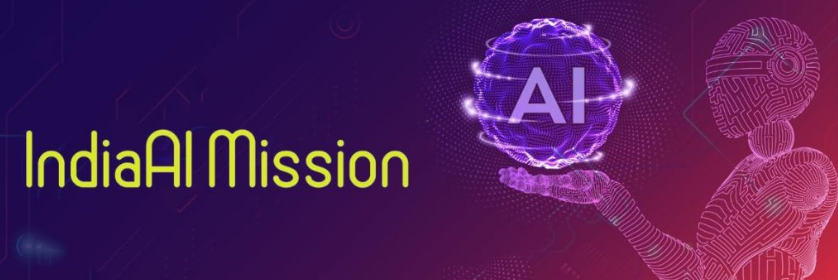Context:
Recently, the Union Cabinet Approved over Rs 10,300 Crore for the IndiaAI Mission to Empower AI Startups and Expand Compute Infrastructure Access
Objectives of IndiaAI Mission
- It aims to strengthen India’s AI ecosystem and position the country as a global leader in AI innovation and technology. It aligns with the Prime Minister’s vision of making AI in India and making AI work for India.
- To build a comprehensive ecosystem through strategic public-private partnerships and enabling industry collaboration.
- To drive responsible and inclusive growth by providing startup risk capital, ensuring socially impactful AI projects, and strengthening ethical AI practices.
- It will be implemented by the ‘IndiaAI’ Independent Business Division (IBD) under Digital India Corporation (DIC).
Key Components:
- IndiaAI Compute Capacity:
Establish a high-end, scalable AI computing ecosystem to meet the increasing demands of India’s AI startups and research sector.
Deployment of over 10,000 Graphics Processing Units (GPUs) through strategic public-private partnerships with 50 per cent viability gap funding.
An AI marketplace will be designed to offer AI as a service and pre-trained models to AI innovators. It will act as a one-stop solution for resources critical for AI innovation. - IndiaAI Innovation Centre:
It will focus on developing and deploying indigenous Large Multimodal Models (LMMs) and domain-specific foundational models in key sectors such as healthcare, agriculture, and finance. - IndiaAI Datasets Platform:
A unified data platform will be developed to provide a one-stop solution for effortless access to non-personal datasets to researchers and Indian startups. - IndiaAI Application Development Initiative:
To promote the adoption of AI applications in critical sectors by addressing problem statements sourced from central ministries, state departments, and other institutions.
It will focus on the development, scaling, and promotion of impactful AI solutions with the potential to catalyse socio-economic transformation on a large scale. - IndiaAI FutureSkills:
To mitigate barriers to entry into AI programs by increasing accessibility to AI courses at undergraduate, master’s, and Ph.D. levels.
To establish data and AI Labs in Tier 2 and Tier 3 cities across India to provide foundational-level courses, ensuring widespread access to AI education. - IndiaAI Startup Financing:
To support and accelerate deep-tech AI startups by providing streamlined access to funding for futuristic AI projects. - Safe & Trusted AI:
It will facilitate the implementation of Responsible AI projects to ensure the ethical and responsible development and adoption of AI technologies.
It will focus on the development of self-assessment checklists for innovators and governance frameworks to ensure the safe and ethical use of AI technology.
Significance:
- Innovation and Domestic Capacities: The IndiaAI Mission will propel innovation and build domestic capacities in AI technology. It will ensure India’s tech sovereignty and position it as a leader in AI development and deployment.
- Employment Opportunities: The mission will harness India’s demographic dividend by creating highly skilled employment opportunities. Thus contributing to economic growth and prosperity.
- Social Good and Global Competitiveness: The mission will demonstrate how AI technology can be used for social good and enhance India’s global competitiveness in the AI sector, showcasing its capabilities to the world.
Challenges for India’s AI Mission:
- Talent Gap: India struggles with a shortage of skilled AI professionals, hindering its ability to conduct groundbreaking research.
- Data Limitations: Balancing privacy concerns and data security with the need for vast, unbiased datasets to train effective AI models creates a complex challenge.
- Infrastructure Needs: Significant investment is required in data storage and access to cutting-edge hardware to power advanced AI applications.
- Ethical Concerns: Developing frameworks to ensure fairness, transparency, and user data protection in AI systems is crucial to avoid ethical dilemmas and build public trust.
- Regulatory Hurdles: Establishing a clear and adaptable legal framework for AI is essential to navigating regulatory challenges effectively.
- Funding Gaps: There is a lack of sufficient funding and policy support needed for research and development.
Way Forward
- India can invest in data centres and computing power for researchers and startups such as Perplexity AI in the United States.
- Public-private partnerships can accelerate AI development in India by leveraging private sector expertise.
- India can study and adapt successful regulatory frameworks from the EU and the US to create its own AI governance strategy.
- Open discussions with industry experts, researchers, and the public are crucial to developing a comprehensive and effective regulatory structure.
- Regulations can initially focus on high-risk sectors like healthcare or finance, expanding gradually to encompass broader areas of AI application.

